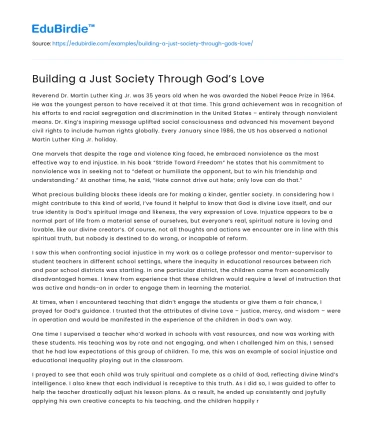Reverend Dr. Martin Luther King Jr. was 35 years old when he was awarded the Nobel Peace Prize in 1964. He was the youngest person to have received it at that time. This grand achievement was in recognition of his efforts to end racial segregation and discrimination in the United States – entirely through nonviolent means. Dr. King’s inspiring message uplifted social consciousness and advanced his movement beyond civil rights to include human rights globally. Every January since 1986, the US has observed a national Martin Luther King Jr. holiday.
One marvels that despite the rage and violence King faced, he embraced nonviolence as the most effective way to end injustice. In his book “Stride Toward Freedom” he states that his commitment to nonviolence was in seeking not to “defeat or humiliate the opponent, but to win his friendship and understanding.” At another time, he said, “Hate cannot drive out hate; only love can do that.”
Save your time!
We can take care of your essay
- Proper editing and formatting
- Free revision, title page, and bibliography
- Flexible prices and money-back guarantee
What precious building blocks these ideals are for making a kinder, gentler society. In considering how I might contribute to this kind of world, I’ve found it helpful to know that God is divine Love itself, and our true identity is God’s spiritual image and likeness, the very expression of Love. Injustice appears to be a normal part of life from a material sense of ourselves, but everyone’s real, spiritual nature is loving and lovable, like our divine creator’s. Of course, not all thoughts and actions we encounter are in line with this spiritual truth, but nobody is destined to do wrong, or incapable of reform.
I saw this when confronting social injustice in my work as a college professor and mentor-supervisor to student teachers in different school settings, where the inequity in educational resources between rich and poor school districts was startling. In one particular district, the children came from economically disadvantaged homes. I knew from experience that these children would require a level of instruction that was active and hands-on in order to engage them in learning the material.
At times, when I encountered teaching that didn’t engage the students or give them a fair chance, I prayed for God’s guidance. I trusted that the attributes of divine Love – justice, mercy, and wisdom – were in operation and would be manifested in the experience of the children in God’s own way.
One time I supervised a teacher who’d worked in schools with vast resources, and now was working with these students. His teaching was by rote and not engaging, and when I challenged him on this, I sensed that he had low expectations of this group of children. To me, this was an example of social injustice and educational inequality playing out in the classroom.
I prayed to see that each child was truly spiritual and complete as a child of God, reflecting divine Mind’s intelligence. I also knew that each individual is receptive to this truth. As I did so, I was guided to offer to help the teacher drastically adjust his lesson plans. As a result, he ended up consistently and joyfully applying his own creative concepts to his teaching, and the children happily responded. What a difference! The transformation was quite deep. After he finished this placement, he let me know how much this experience had helped him, and he even asked me for teaching references.
There is no doubt that since the 1960s, good progress has been made in reducing discrimination; however, there’s more to be done. No matter where in the world we live, or what our background is, we can let an understanding of God as Love and of everyone as Love’s reflection inspire our words and deeds. In this way, we can contribute to the work of building a just society as the norm for all.






 Stuck on your essay?
Stuck on your essay?

